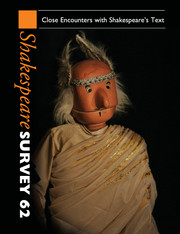Book contents
- Frontmatter
- Shakespeare, text and paratext
- The popularity of Shakespeare in print
- The continuing importance of new Bibliographical method
- ‘Honour the real thing’: Shakespeare, Trauma and Titus Andronicus in South Africa
- ‘O, these encounterers’: on Shakespeare’s meetings and partings
- A play of modals: Grammar and potential action in early Shakespeare
- Merry, marry, Mary: Shakespearian wordplay and Twelfth Night
- A subtle point: Sleeves, tents and ‘Ariachne’s broken woof’ (again)
- The look of Othello
- Red button Shakespeare
- ‘Mark you / his absolute shall?’: Multitudinous tongues and contested words in Coriolanus
- Chagall’s Tempest: An autobiographical reading
- Reading illustrated editions: Methodology and the limits of interpretation
- Close encounters with Anne Brontë's Shakespeare
- Shakespeare and the magic lantern
- Shakespeare and the coconuts: close encounters in post-apartheid South Africa
- The Schrödinger effect: Reading and misreading performance
- Behind the scenes
- Inner monologues: Realist acting and/as Shakespearian performance text
- More japanized, casual and transgender shakespeares
- Translation futures: Shakespearians and the foreign text
- After translation
- ‘The single and peculiar life’: Hamlet’s heart and the early modern subject
- Mapping King Lear
- ‘Last on the stage’: The place of Shakespeare in Charles Darwin’s ethology
- Sense/memory/sense-memory: Reading narratives of Shakespearian rehearsals
- Shakespeare performances in England (and Wales), 2008
- Professional Shakespeare productions in the British Isles, January–December 2007
- The Year's Contributions to Shakespearian Study 1 Critical Studies
- 2 Shakespeare in performance
- 3a Editions and textual studies
- 3b Editions and textual studies
- Index to Volume 62
Shakespeare and the coconuts: close encounters in post-apartheid South Africa
Published online by Cambridge University Press: 28 November 2009
- Frontmatter
- Shakespeare, text and paratext
- The popularity of Shakespeare in print
- The continuing importance of new Bibliographical method
- ‘Honour the real thing’: Shakespeare, Trauma and Titus Andronicus in South Africa
- ‘O, these encounterers’: on Shakespeare’s meetings and partings
- A play of modals: Grammar and potential action in early Shakespeare
- Merry, marry, Mary: Shakespearian wordplay and Twelfth Night
- A subtle point: Sleeves, tents and ‘Ariachne’s broken woof’ (again)
- The look of Othello
- Red button Shakespeare
- ‘Mark you / his absolute shall?’: Multitudinous tongues and contested words in Coriolanus
- Chagall’s Tempest: An autobiographical reading
- Reading illustrated editions: Methodology and the limits of interpretation
- Close encounters with Anne Brontë's Shakespeare
- Shakespeare and the magic lantern
- Shakespeare and the coconuts: close encounters in post-apartheid South Africa
- The Schrödinger effect: Reading and misreading performance
- Behind the scenes
- Inner monologues: Realist acting and/as Shakespearian performance text
- More japanized, casual and transgender shakespeares
- Translation futures: Shakespearians and the foreign text
- After translation
- ‘The single and peculiar life’: Hamlet’s heart and the early modern subject
- Mapping King Lear
- ‘Last on the stage’: The place of Shakespeare in Charles Darwin’s ethology
- Sense/memory/sense-memory: Reading narratives of Shakespearian rehearsals
- Shakespeare performances in England (and Wales), 2008
- Professional Shakespeare productions in the British Isles, January–December 2007
- The Year's Contributions to Shakespearian Study 1 Critical Studies
- 2 Shakespeare in performance
- 3a Editions and textual studies
- 3b Editions and textual studies
- Index to Volume 62
Summary
South African literary history is full of the effects of writers having had close encounters with the Shakespeare text. The results have been literary and personal, with writers displaying, and often-times clearly experiencing, a profound emotional connection to, especially, the plays. Since the days of the mission schools in colonial Southern Africa, Shakespeare has been a signifier of education, civility and erudition, as well as a vehicle for the expression of strong feelings. Encounters with the Shakespeare text have shaped hopes, allowed for public self-fashioning, and have influenced more intimate subjectivities as writers and scholars of a particular class stratification were educated in English Literature. Something has changed, though, in terms of what a close encounter with Shakespeare enables. If Shakespeare used to be part of a marker of class and social mobility located in the terms of a discourse of progress and modernity, knowledge of Shakespeare now comprises a much more publicly ambivalent display. Shakespeare once had a particular currency, acquired personally but activated publicly, which he appears to be losing. This article will attempt to account for the change, suggesting that it reveals the gap between theory and lived experience. Close encounters with Shakespeare viewed through a post-colonial lens illustrate that culture is hybrid. Nevertheless, in the face of ongoing socio-economic power differentials which operate along raced and classed axes, the logic of a binary structure of identity continues to inform an experience of Shakespeare in South Africa long after our own cultural artifacts reveal that binary models are an artificial and inadequate way to understand how people live, including how they live with Shakespeare.
- Type
- Chapter
- Information
- Shakespeare Survey , pp. 211 - 221Publisher: Cambridge University PressPrint publication year: 2009
- 1
- Cited by



